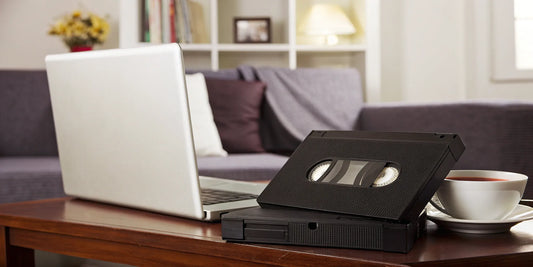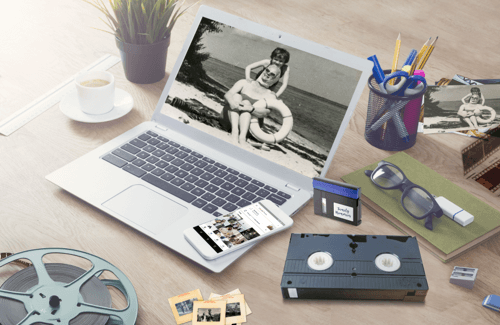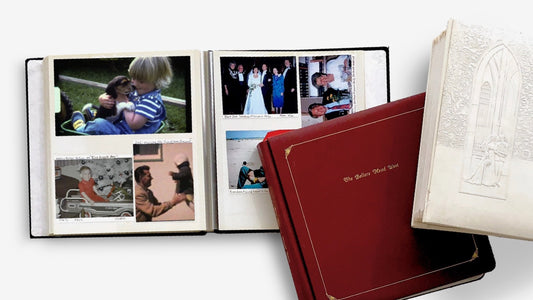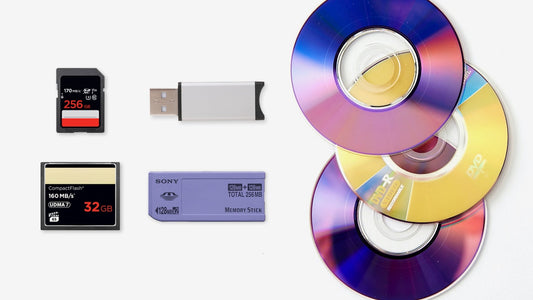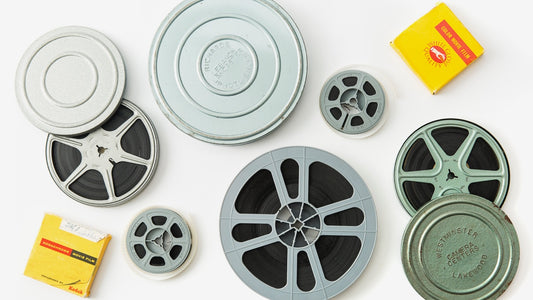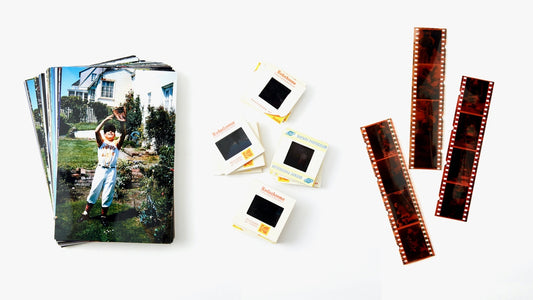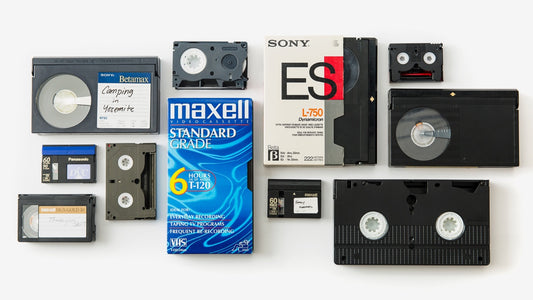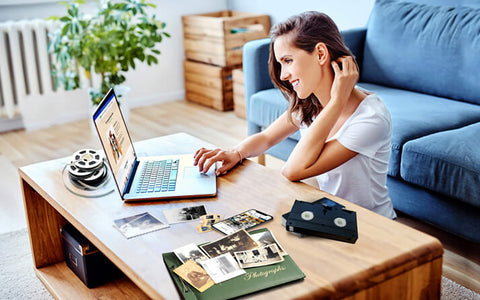That box of old VHS tapes isn't just clutter. It's a collection of tangible links to your family's story—the laughter, milestones, and everyday moments you can't get back. The real question is what to do with old VHS tapes to make those memories accessible again. This is about more than clearing a shelf; it’s about safeguarding your legacy. We’ll show you how to bring those cherished videos into the digital age and decide what to do with the physical tapes once your memories are secure.
Key Takeaways
- Handle VHS Disposal with Care: Standard recycling can't process VHS tapes due to their mixed materials; look for e-waste facilities or mail-in programs to dispose of them responsibly.
- Preserve Your Home Movies Digitally: Before doing anything else with your tapes, convert your personal video recordings to digital to protect those irreplaceable moments from being lost to tape decay.
- Explore Creative Options for Physical Tapes: Once digitized, give your old tapes a new purpose by donating them, selling collectible ones, or transforming them into unique DIY projects.
Why Can't You Just Throw Away Old VHS Tapes?
It might seem easy to just toss those old VHS tapes in the trash or the recycling bin, but there’s a bit more to it if we want to be mindful of our planet. Before you decide what to do with your collection—especially after you’ve picked out the precious memories you want to preserve by digitizing them—it’s helpful to understand why thoughtful disposal is so important. These tapes hold moments we cherish, but the physical tapes themselves need a responsible farewell.
How Old Tapes Impact the Environment
Let's be honest, VHS tapes weren't designed with Mother Earth in mind. The biggest issue is what they're made of. As Legacybox notes, "Tapes are made of plastic which will never degrade in a landfill and the magnetic tape strip coating on the film leaves behind toxic residue." That means the bulky plastic casing sticks around pretty much forever, and the tape itself can leach harmful stuff into the soil and water over time. It's a sobering thought for items that once brought so much joy.
Plus, recycling them isn't straightforward. VHS tapes are a mix of different materials—hard plastic shells, metal screws, and that Mylar magnetic tape. Enviroliteracy points out that "The complex nature of VHS tapes requires specialized equipment and processes to properly separate and recycle the various components." This complexity means they can't just be tossed in with your usual household recyclables like paper and plastic bottles.
Making the Case for Responsible Disposal
So, why can't you just slip them into your curbside recycling bin alongside your cardboard and glass? Well, most "standard recycling facilities are set up to process commonly recycled materials like paper, cardboard, and certain plastics, all of which are typically made of one type of material," as Enviroliteracy explains. VHS tapes, with their jumble of materials, can actually contaminate a whole batch of otherwise good recyclables. Even worse, they can sometimes jam or damage the sorting machinery at these facilities, causing headaches and extra costs.
This is where responsible handling comes into play. It’s about finding ways to deal with these tapes that minimize their environmental harm. For items containing sensitive information, there are even specialized e-waste recycling services that ensure secure destruction, like GreenDisk, which Recycle Right NY mentions provides "secured and audited disposal of personal property that's stored on digital media." While your home movies might not be top-secret, knowing there are specialized services highlights that these aren't your average throwaway items. Taking a little extra care ensures we're not adding to landfill problems unnecessarily.
How to Recycle or Dispose of Your VHS Tapes
So, you’ve taken that wonderful step of preserving your precious memories by converting your VHS tapes to digital, which is fantastic! But now, you’re probably looking at a stack of old cassettes and wondering, "What on earth do I do with these?" It’s a common question, and the answer isn't as simple as tossing them into your regular recycling bin. VHS tapes, with their blend of different plastics, magnetic tape, and small metal parts, are a bit of a puzzle for standard recycling facilities. These facilities are typically set up to handle simpler, single-stream materials like paper, glass, and certain types of plastic containers, not complex items like old video cassettes.
The challenge with VHS tapes lies in their construction. The outer shell is usually made of polypropylene (PP or #5 plastic) or polystyrene (PS or #6 plastic), while the tape itself is a polyester film (PET) coated with magnetic particles. Separating these components efficiently is a specialized task that most municipal recycling programs aren't equipped for. If they do end up in the regular recycling stream, they can cause problems, potentially contaminating other recyclables or even damaging sorting equipment. That’s why it’s so important to find a more responsible disposal route. The good news is, there are definitely better options than the landfill, and I’m here to guide you through how to find them and what you need to know. We'll look at local programs, specific guidelines, and even bust a few myths along the way.
Find a Local E-Waste Recycling Center
Your first port of call should be to check for specialized recycling options in your community. Many towns and cities host periodic e-waste (electronic waste) collection events where they might accept items like VHS tapes. You can usually find information about these events on your local municipality's website or by giving their waste management department a call.
Another avenue is to search for dedicated e-waste recycling centers near you. Some facilities are equipped to handle more complex items like VHS tapes, breaking them down into their component parts for recycling. A quick online search for "e-waste recycling near me" or "VHS tape recycling [your town/city]" can point you in the right direction. Some companies also offer mail-in programs, which can be a convenient option if local facilities are scarce.
VHS Recycling: The Do's and Don'ts
It's really important to understand that VHS tapes can't just be thrown in with your usual paper and plastic recyclables. Standard recycling facilities are generally set up for common, single-material items. The mixed composition of VHS tapes—the plastic shell, the Mylar magnetic tape, and various metal screws and internal parts—means they need a more specialized disassembly and recycling process.
Before you head to any facility or use a mail-in service, always check their specific guidelines. Some places might only accept the tapes, while others might require you to remove the paper sleeves first. Knowing their rules beforehand saves you time and ensures your tapes are handled correctly, giving them the best chance at being properly recycled.
Debunking Common VHS Disposal Myths
Let's clear up a common misconception: simply tossing VHS tapes into your household recycling bin is rarely the right move. Most municipal recycling programs are not equipped to process them, and they can end up contaminating other recyclables or damaging sorting machinery. This well-intentioned act can unfortunately do more harm than good in the standard recycling stream.
The good news is there are factual, responsible alternatives. For instance, some specialized companies focus on media recycling. GreenDisk is one such service that offers mail-in options for various types of "technotrash," including VHS tapes, ensuring they are securely and properly processed. Additionally, keep an eye out for state or local e-waste initiatives. For example, some states have laws like the NYS Electronic Equipment Recycling and Reuse Act, which mandates manufacturer take-back programs for certain electronics, and sometimes these programs or related local drop-off sites might accept media like VHS tapes. Always verify what's accepted before you go.
Give Your Tapes a Second Life: Where to Donate or Sell
So, you've decided your VHS tapes aren't heading to a recycling facility, and perhaps you've already taken the wonderful step of preserving your precious memories by converting them to digital. That's fantastic! Now, what about the physical tapes? Giving them a second life through donation or even selling them can be a really rewarding option. You might be surprised by who could still use them or what hidden treasures you might uncover in your collection.
Places That Welcome VHS Tape Donations
It’s a common scenario: a stack of old VHS tapes collecting dust, and you’re wondering what to do with them. The good news is several places might be happy to take them. Consider reaching out to local schools, libraries, or nursing homes. These organizations often use VHS tapes for educational content or entertainment for their communities. Thrift stores and various charities are also common drop-off points for donations. Before you load up your car, it’s a smart idea to call ahead and confirm they are currently accepting VHS tapes.
Another great avenue is to explore community-based options. You can often offer your tapes on local Freecycle networks or "Buy Nothing" groups you might find on social media. This way, you can connect directly with individuals in your area who are specifically looking for tapes, ensuring they go to a home where they'll be appreciated.
How to Prep Your Tapes for Donation
Before you pass on your VHS tapes, it’s really important to take a few moments to figure out what’s actually on them. This step is crucial, especially if you're a bit hazy on their contents. You definitely wouldn't want to accidentally give away irreplaceable family videos or moments you thought were long lost! If you discover tapes filled with home movies—birthdays, holidays, school plays—your first step should be to safeguard those memories by getting them digitized. Once your memories are securely in a digital format, you can then decide on the next chapter for the physical tapes.
For the tapes you’re planning to donate, a quick check of their physical condition is also helpful. While most places accepting donations understand these are older items, a tape that's visibly damaged, broken, or has mold might be better suited for responsible disposal.
Turn Your Tapes into Cash: Tips for Selling
Here’s an exciting thought: some of those old VHS tapes tucked away in your attic or basement could actually be quite valuable! It might sound surprising, but certain rare, out-of-print editions, or cult classic films on VHS can fetch a decent price from collectors. If you have a hunch you might be sitting on something special, online marketplaces like eBay or Etsy are excellent places to see what similar tapes are selling for and list your own.
When it comes to the value of collectible VHS tapes, condition is absolutely key. Tapes that are still sealed in their original packaging and are in pristine shape generally command the highest prices. There have even been reports of classic films on VHS in mint condition selling for impressive amounts. So, carefully examine your collection – you just never know if a hidden treasure is waiting to be discovered!
What Makes a VHS Tape Valuable?
Before you start sorting through your collection, it’s helpful to understand what separates a dusty old tape from a valuable collector's item. Not every VHS tape is a hidden gem, but certain factors can turn a common movie into a sought-after piece of physical media. The value is often a combination of how rare the tape is, its physical condition, and the story behind it. It’s a fascinating niche where nostalgia meets collectibility, and understanding these key elements will help you get a much clearer picture of what you might have on your hands.
Rarity and Condition
The two biggest factors that determine a VHS tape's value are its rarity and condition. Just like with comic books or vinyl records, the fewer copies of a particular tape that exist, the more a collector is willing to pay for it. This is especially true for films that had a limited release, were pulled from shelves, or were part of a special edition. As CGC Home Video points out, "VHS tapes are becoming increasingly valuable as collectors vie for the most popular and rarest movie titles." The physical state of the tape and its sleeve is just as important. A tape in mint, like-new condition will always be worth more than one with a cracked case or a worn-out box.
The Role of Professional Grading
For serious collectors, professional grading can significantly impact a tape's worth. Companies like CGC Home Video specialize in authenticating and evaluating the condition of VHS tapes. They check everything from the integrity of the factory seal to the quality of the box, then assign a grade and encase the tape in a protective slab. This process removes guesswork and provides a standardized measure of quality. A professionally graded tape, especially one with a high score, can sell for much higher prices at auctions because buyers have a trusted, third-party verification of its condition and authenticity.
A Tape's History (Provenance)
A tape's history, or provenance, plays a huge role in its value, and nothing tells a better story than an unopened package. Think about it: most people bought VHS tapes to watch them. Because of this, tapes that are still in their original factory shrink-wrap are incredibly rare. A sealed tape is a time capsule, preserved exactly as it was on the store shelf decades ago. This pristine, untouched state is what collectors dream of, making sealed copies of even relatively common films far more valuable than their opened counterparts. It’s the ultimate proof of a tape’s mint condition.
The Power of Nostalgia
Never underestimate the power of a trip down memory lane. For many, VHS tapes are a tangible link to their childhood and a simpler time. This feeling of nostalgia is a major driving force behind the growing interest in collecting tapes. People want to own the physical copies of the movies that shaped their youth, from beloved animated classics to cheesy horror flicks they watched at sleepovers. This emotional connection creates demand, and as more people seek to recapture a piece of their past, the value of these cultural artifacts continues to rise.
How Much Are Your VHS Tapes Worth?
Now for the million-dollar question—or in some cases, the hundred-thousand-dollar question! The value of VHS tapes spans a massive range. While the vast majority of tapes might only be worth a few dollars, some rare finds have sold for astonishing amounts. It all comes down to rarity, condition, and demand. It's important to have realistic expectations; your copy of Titanic that you've watched a dozen times probably isn't going to fund your retirement. However, understanding the different tiers of value can help you spot a potential treasure if you have one.
High-Value Collectibles and Record Sales
The ceiling for VHS tape value can be shockingly high. To give you an idea of the market's peak, a first-print copy of Star Wars: A New Hope sold for a staggering $114,000 at auction. Other blockbuster sales include first prints of movies like The Goonies and Back to the Future fetching tens of thousands of dollars. These are typically pristine, sealed, and professionally graded copies of iconic films. While these record-breaking sales are outliers, they show just how serious the VHS collecting market has become and the incredible value placed on the rarest items.
Mid-Range Tapes vs. Common Tapes
While not every tape is a lottery ticket, there's a healthy market for mid-range collectibles. For example, early releases of classic horror films like Halloween II and A Nightmare on Elm Street have sold for around $15,000 each. These are still significant sums and are often for rare editions in excellent condition. On the other end of the spectrum are the common, mass-produced tapes that filled every video store and home in the '90s. These are typically worth very little, often just a dollar or two, because millions of copies are still in circulation.
Popular Collectibles like Disney's "Black Diamond" Tapes
If you've ever looked into selling VHS tapes, you've likely heard of Disney's "Black Diamond" editions. These are the original 18 animated classics released on VHS between 1984 and 1994, identifiable by a black diamond logo on the spine of the clamshell case. These tapes are very popular with collectors, and you'll see them listed for a wide range of prices online. While there's a lot of hype, their actual value depends heavily on the specific title and its condition. Some, like Beauty and the Beast, are more common, while others are harder to find, but they remain a well-known entry point for many VHS collectors.
The Modern VHS Marketplace
If you're ready to buy or sell, it helps to know where the action is. The marketplace for VHS tapes is vibrant and diverse, with options for everyone from the casual enthusiast to the serious collector. Online platforms have made it easier than ever to connect with a global community of fans and find specific tapes you're looking for. Whether you're hunting for a specific genre, trying to complete a collection, or just curious about what's out there, the modern marketplace has plenty to explore.
Finding Different Genres and Editions
The VHS market is incredibly diverse, catering to almost every taste imaginable. On sites like eBay, you can find tapes across a huge array of genres, including Horror, Sci-Fi, Children's & Family, Action, and Comedy. This makes it easy to search for specific movies or browse categories that interest you. Collectors often focus on particular niches, like '80s horror films, obscure animated features, or even educational and sports-related tapes. This specialization is part of what makes the hobby so engaging—there’s always a new, rare edition or forgotten film to discover.
Buying in Bulk and Finding Blank Tapes
For those just starting a collection or looking for a fun project, buying VHS tapes in bulk can be a great option. Sellers often list large "lots" of tapes online, which can be an affordable way to acquire a variety of films at once. You can also find a niche market for blank VHS tapes. Some people use them for retro-style art projects or for recording with VCRs to achieve a vintage aesthetic. Companies like Retrospekt even sell new blank tapes, including fun versions like transparent or glow-in-the-dark cassettes, proving that the format is still alive and well for creative purposes.
Keep Your Memories Alive: Convert VHS to Digital
Those old VHS tapes are more than just plastic and magnetic tape; they're treasure chests filled with precious moments – baby's first steps, hilarious family vacations, and heartwarming holiday gatherings. But as time marches on, VHS tapes degrade, and players become harder to find. The good news? You can bring those memories into the modern age by converting your VHS tapes to digital formats. This not only preserves them for generations to come but also makes them incredibly easy to watch, share, and enjoy on your computer, TV, or even your phone.
Imagine being able to instantly pull up that embarrassing '90s birthday party video or share your parents' wedding footage with family members across the globe. Digitizing your tapes makes this a reality. It’s a wonderful way to ensure these irreplaceable moments aren't lost to time or technological obsolescence. Whether you're a tech-savvy DIYer or prefer to leave it to the pros, there's a path for you to safeguard those cherished memories. Think of it as an investment in your family's legacy, ensuring these visual stories continue to bring joy and connection for everyone to revisit.
The Disappearing VCR: Why Digitizing Matters Now
Let's talk about the elephant in the room: when was the last time you saw a VCR for sale at a major electronics store? Finding a working player is becoming a real challenge, much like trying to find a cassette player for your car. As technology has moved on, these machines have become increasingly scarce. This presents a real problem because even if your tapes are in perfect condition, they're essentially useless without a VCR to play them. The memories of first steps and family holidays are locked away on a format that's quickly becoming obsolete, making it more important than ever to free them from their plastic prisons.
The challenge doesn't stop with the VCR. The tapes themselves are fighting a losing battle against time. The magnetic tape inside each cassette is fragile and degrades with each passing year, even when stored carefully. This decay can lead to faded colors, distorted sound, and eventually, a complete loss of the video. It's a quiet process, but it means those irreplaceable moments are slowly vanishing. By choosing to digitize your home movies, you're not just updating the format; you're creating a permanent, high-quality copy that stops this degradation in its tracks. It’s an investment in your family's legacy, ensuring those stories can be shared and enjoyed for many years to come.
How to Convert Your Tapes to Digital at Home
If you're comfortable with a bit of tech and enjoy a hands-on project, converting your VHS tapes at home can be a rewarding option. You'll need a working VCR, a computer, and a VHS-to-digital converter. These converters often come as small devices that connect your VCR to your computer, usually via USB. One detailed suggestion involves using an affordable HDMI capture card, OBS Studio software, and an AV to HDMI adapter to digitize the tapes yourself. This setup allows you to play your tapes on the VCR and record the output directly onto your computer. While it might take some time, especially if you have a large collection, doing it yourself gives you complete control over the process and can be cost-effective.
Finding the Best VHS to Digital Conversion Service
If the DIY route sounds a bit daunting, or if you simply don't have the time, professional digitization services are an excellent alternative. Companies like YesVideo specialize in carefully handling your precious tapes and converting them to high-quality digital files. We understand how important these memories are, which is why every order is processed by hand right here in the USA. Using a professional service means you can trust that your video transfer will be handled with expertise, ensuring the best possible quality from your aging tapes. It’s a convenient and reliable way to preserve your family’s history without the hassle of sourcing equipment or troubleshooting technical issues, letting you focus on the joy of rediscovering those moments.
Comparing Your VHS Conversion Options
Ultimately, the "best" way to convert your VHS tapes to digital depends on your comfort level with technology, your budget, and how much time you have. For those who are tech-inclined and have a smaller collection, the DIY method can be a fulfilling project. However, for many, especially those with numerous tapes or concerns about handling delicate old media, a professional service offers peace of mind and high-quality results. Beyond conversion, remember that some tapes might be suitable for donation or even selling if they contain collectible content. But for those irreplaceable family moments, digitization is truly the best path to keep them safe and accessible for years to come.
Get Crafty: Creative Ways to Upcycle Old VHS Tapes
So, you've taken the wonderful step of preserving your cherished memories by digitizing your home movies, but now you're left with a pile of old VHS tapes. Before you think about tossing them, why not give them a second life? Getting crafty with your old tapes is a fantastic way to reduce waste, unleash your creativity, and add a unique, retro touch to your home. It’s a win-win!
DIY Home Decor Projects Using VHS Tapes
This is where your inner artist can truly shine! Those old VHS tapes, with their sturdy black cases and intriguing spools of tape, are surprisingly versatile materials for home decor. Think beyond their original purpose and imagine them as building blocks for something entirely new and eye-catching. You can find plenty of DIY craft ideas online, ranging from quirky wall art installations to unique shelving units or even planters. Some people even carefully unravel the tape itself to create textured art pieces or weave it into interesting patterns. Upcycling VHS tapes isn't just a fun weekend project; it's a wonderful way to express your personal style and make a small, positive impact on the environment by keeping these plastics out of landfills.
Practical Upcycling Ideas for Old Tapes
Beyond just looking cool, your old VHS tapes can be transformed into genuinely useful items around your house. Creative individuals have discovered ingenious ways to reuse both the tape and the plastic cases for all sorts of practical crafts, and you can often find online tutorials to guide your projects. Imagine weaving the durable magnetic tape into unique, sturdy bags, small decorative rugs, or even photo frames. The hard plastic cases themselves are perfect for organizing small items like craft supplies, office essentials, jewelry, or those little odds and ends that never seem to have a home. With a bit of imagination, you can create custom storage solutions that not only declutter your space but also add a fun, nostalgic vibe.
What's the Best Path for Your VHS Collection?
Figuring out what to do with that box (or boxes!) of old VHS tapes tucked away in a closet or the attic is a common task many of us face. It’s more than just decluttering; it’s about handling memories, moments from the past, and maybe even a few cinematic treasures. Before you decide to toss, donate, or sell, let's walk through a few important things to consider. Taking a little time to assess what you have and what it truly means to you will help you choose the best next step for your unique collection.
Assessing Your Collection: What to Keep vs. Toss
First things first, let’s play detective and figure out what’s actually on those tapes. It’s so important to determine their contents before making any rash decisions. You might unearth priceless family videos – your child’s first steps, unforgettable holiday gatherings, or those charmingly awkward school plays – that you’d be heartbroken to lose. Take a moment to look at the tapes themselves. Are they covered in dust, showing signs of mold, or physically damaged? The condition can impact whether they’ll play and if they can be saved. Remember, those personal recordings are irreplaceable, holding a sentimental value that no price tag can match. If they're home movies, choosing to digitize your videotapes is a wonderful way to safeguard those precious moments for generations to come.
Finding the Balance Between Nostalgia and Space
It's completely normal to feel a wave of nostalgia when you handle those familiar VHS sleeves. For many of us, they represent cherished memories and perhaps a simpler time. While VHS technology is largely a thing of the past, there's still a surprising niche market for certain tapes, especially if they're rare, still sealed, or feature cult classic films. The actual monetary value often hinges on the movie's popularity, its rarity, and, crucially, the tape's condition. For instance, some limited edition VHS tapes can command impressive prices among dedicated collectors. However, for the average collection of recorded TV programs or common blockbuster movies, the practical, monetary value might be quite low. It's about weighing that sentimental pull against the physical space they occupy and the effort required to maintain them.
How to Properly Store the Tapes You Keep
If you decide to hold onto some or all of your VHS tapes, even if it's just for a little while longer, knowing how to store them correctly is really important. VHS tapes weren't designed to last forever; unfortunately, they can degrade over time due to various environmental factors. Heat, humidity, and exposure to magnetic fields (like those from speakers or other electronics) are their biggest threats, potentially leading to brittle tape, mold growth, or a significant loss of picture and sound quality. To give them their best shot, store your tapes upright (like books on a shelf) in a cool, dry, and dark place. Keep them away from direct sunlight, radiators, and areas prone to dampness. While proper storage can certainly help prolong their life, always remember that family memories are priceless. For those truly irreplaceable recordings, converting them to a digital format is the most reliable way to ensure they endure.
Related Articles
- VHS Videos to DVD: The Ultimate 2024 Guide – YesVideo
- Convert VHS to Digital: The Ultimate 2024 Guide – YesVideo
- VHS Tape to Digital: The Ultimate 2024 Guide – YesVideo
- Best VHS Video to Digital Converters: Top Picks – YesVideo
- Change VHS to DVD: Easy Step-by-Step Guide – YesVideo
Frequently Asked Questions
I've got a big box of old VHS tapes. What's the most important first step before I decide what to do with them? Before you do anything else, it's super important to figure out what's actually recorded on those tapes. If you find irreplaceable family videos, like birthdays or holidays, your top priority should be getting those precious moments converted to a digital format. This way, they're safe and sound, no matter what you decide to do with the physical tapes afterward.
Can I just toss my old VHS tapes into my curbside recycling bin with paper and plastics? That's a common thought, but unfortunately, VHS tapes usually can't go into your regular household recycling. They're made of mixed materials that standard facilities aren't equipped to handle, and they can actually cause problems in the sorting process. It's always best to look for specialized e-waste recycling options in your area instead.
Some of my VHS tapes are store-bought movies. Could any of them be valuable? It's possible! While most common movies on VHS aren't worth a lot, certain rare editions, cult classics, or tapes still in their original sealed packaging can be quite collectible. The condition of the tape and its cover is really important, so if you think you have something special, it might be worth checking online marketplaces to see what similar items are selling for.
I want to save my home movies, but I'm not very tech-savvy. What's the simplest way to convert them to digital? If tackling the technology yourself feels overwhelming, using a professional digitization service is definitely the most straightforward approach. Companies that specialize in this, like YesVideo, handle the whole process for you, carefully converting your tapes to digital files. It takes the guesswork out of it and ensures your memories are preserved with good quality.
What if I don't want to recycle or sell my tapes, but I also don't want them to just sit around after I've digitized them? If you've already digitized the important memories, there are still some great options! You could donate tapes with commercial movies or shows to places like local libraries, schools, or thrift stores—just call ahead to see if they're accepting them. Or, if you're feeling creative, you can find some really fun DIY projects online to upcycle the tapes into unique decor or useful household items.




